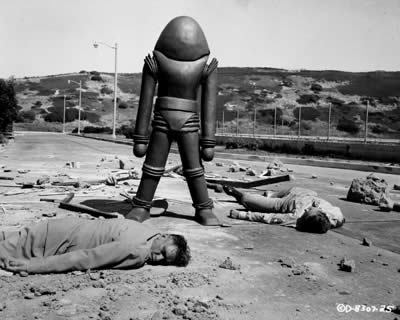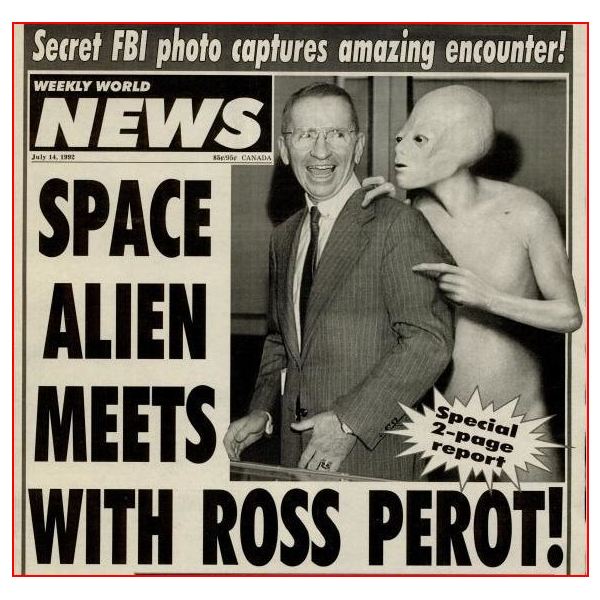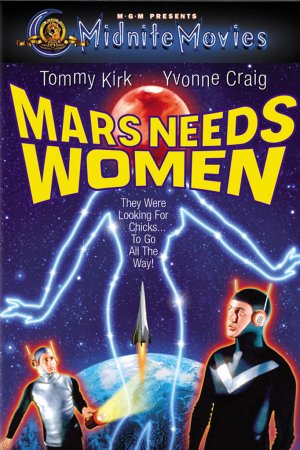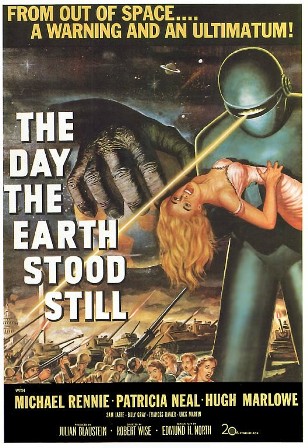|
Craig White's Literature Courses Scenarios (or styles) for Literature of the Future |
|
 humans = Rambo; aliens = super-terrorists |
Alien contact! exploring and being explored; self & other |
 We come in peace! |
![]()
Identification
Alien contact is perennially the most popular theme of standard science fiction—futuristic humans from Earth fly on spaceships to explore alien civilizations as in Star Trek . . .
OR
Aliens attack, invade, or otherwise visit Earth as in Independence Day, The War of the Worlds, E.T. the Extra-Terrestrial, The Day the Earth Stood Still, and many other titles with variations in content and genre-style.
(Genre is usually romance-adventure for both but may become comedic or satirical, as with Men in Black or Mars Attacks!)
![]()
Narratives and aesthetics
Narrative conflict or adventure rises from characters—humans and aliens—encountering each other as self and other, assessing possibilities of fight-flight or exchange, followed by action, learning, resolution, sometimes with an open-ended future.
The Aesthetics (sensory and intellectual pleasures) of alien contact often involve the tension or terror of the self meeting the other and a sense of wonder or the sublime.
(The sublime always threatens to turn into the ridiculous, however. See Men in Black, Mars Attacks!, or Clintons and Space Alien below.)
![]()
Protagonists / heroes: The human "space ranger" like Buck Rogers, Captain Kirk, or Han Solo is the classic example of the science fiction protagonist as "the competent man" who can rise to any challenge, repair or improvise technology, decide quickly and shoot accurately—much like a heroic cowboy-ranger on the western frontier.
Standard pop science fiction until recently follows formulaic romance characterization of heroic men and helplessly confused women, with the male hero's populist virtue contrasted and validated by an extraterrestrial villain, who often appears as an exotic "other" to the Anglo-American "self."
With women's equality, recent women characters become less helpless and sometimes lead missions; e.g. Ripley in the Alien series.
Antagonists / villains: In early sci-fi, if the villain was humanoid, he often appeared Oriental (e.g. Ming the Merciless in Flash Gordon; lately the villain more often appears as a cold, sneering European.
The villain may also appear non-human, frequently combining insect and reptile features.
Villains may also be ghostly or immaterial, or satanically-tempting and deluding shape-shifters, as in Species.
Or ever the zombie option where aliens take over human bodies living or posthumous.
In any case, science fiction villains often share features with contemporary terrorists, particularly by behaving in "inhuman" ways such as ambushing innocent humans or eating, taking over, or otherwise desecrating human bodies.
![]()
Setting: Two dimensions prevail, with many variations between.
![]() Alien invasion stories occur mostly on Earth, occasionally on a spaceship or
colony from
Earth (as in the original Alien or Space 1999).
Alien invasion stories occur mostly on Earth, occasionally on a spaceship or
colony from
Earth (as in the original Alien or Space 1999).
![]() Exploration stories take place in outer space or on
newly discovered planets.
Exploration stories take place in outer space or on
newly discovered planets.
![]()
Time-frame relative to narratives of the future
Exploring alien civilizations is normally deep-future and more or less evolutionary; being explored is near-future and usually apocalyptic.
Alien invasion stories are typically apocalyptic, with much of the action taking place in a post-apocalyptic survival mode.
However, "alien infiltration" stories like "The Belonging Kind" appear more evolutionary, as though a new intelligent species is evolving in nearby ecological niches. (Compare "Bears Discover Fire.")
More on evolution: Stories like "The Poplar Street Study" show aliens altering the social environment of Earth. Older people, used to old ways, cannot adapt, but younger, smart people like Sunny, who aren't as invested in previous social or environment models, quickly see the new reality, learn from it, and adapt accordingly.
Stories like "They're Made Out of Meat" and "Hinterlands" show evolutionary-scale cosmic time-spans beyond human intelligence or conceptualization, in contrast to apocalytpic time-frames, which fit humanity's general inability to think beyond its own generation.
![]()
Utopia or dystopia? / Decline or Progress?
Alien invasion > dystopia, slavery, colonial oppression?
Humans exploring in spaceships often imitate the multicultural politics of military movies in which representatives of various ethnicities work together as a team. The original Star Trek was famous for showing the first interracial kiss on American television, a liberty granted by its deep-future setting.
If American or First-World humans are spreading civilization to other planets, as with colonialism this scenario assumes extraterrestrials have everything to learn from us and we have nothing to gain from them except resources, trade, and possible colonies.
![]()
Literary and Popular Appeals:
Apocalyptic immediacy of alien invation
Battle action, plus fewer reservations about killing aliens (esp. alien robots) than about killing other earthlings.
Sexual titillation, e. g.,
|
|
|
Outside sources:
Friendly introduction to online studies of alien-contact scenarios: Christian Schoon, "Alien Contact . . . "
Discovery article: "To Save the Galaxy, Destroy Humanity!"

Aliens as comedy or humor
Weekly World News, 1979-2007
 |
 |
 |
 |
 |
 |
Questions raised by popularity of Alien Contact scenario
An extraterrestrial who somehow saw our television and movies might conclude that humans have abundant historical experience exploring other worlds or being visited by creatures from other planets.
In fact, however, no direct or irrefutable evidence* exists that Earth has ever been visited by extraterrestrials. (Books like Erich von Daniken's Chariots of the Gods or the History Channel's Ancient Aliens say, "If you accept this premise, then this extrapolation could mean . . . ," but their premises are never anything that reputable scientists acknowledge as indisputable fact.) (*"Navy Pilots . . . UFO Sightings")
This situation raises two questions:
1. Why do people on earth constantly fantasize about extraterrestrial life?
2. Since compelling statistical evidence exists that life should exist elsewhere in our universe, why hasn't Earth been visited or at least received a signal from an intelligent life source somewhere, anywhere in our galaxy? Fermi Paradox (Fermi Paradox)
Possible answers to Quesstion 1. Why do people on earth constantly fantasize about extraterrestrial life?
![]() Since
extraterrestrial species can be imagined, their creation can become a playground
of human creativity—a playground that is all the freer for their being no
reality to limit creativity. However, with few exceptions nearly all
exterrestrial creatures in film or video look humanoid with cosmetic differences (Klingons'
wrinkles, Vulcans' pointy ears). When ET creatures are not humanoid, they often
become repulsive giant insects or have tentacles as in Starship
Troopers or Independence Day.
Since
extraterrestrial species can be imagined, their creation can become a playground
of human creativity—a playground that is all the freer for their being no
reality to limit creativity. However, with few exceptions nearly all
exterrestrial creatures in film or video look humanoid with cosmetic differences (Klingons'
wrinkles, Vulcans' pointy ears). When ET creatures are not humanoid, they often
become repulsive giant insects or have tentacles as in Starship
Troopers or Independence Day.
![]() Aliens
correspond to ghosts but in space rather than time. Whereas ghosts are
human-like intelligences from a future beyond death, aliens are a human-like
intelligence from a space (not a time) beyond Earth.
Aliens
correspond to ghosts but in space rather than time. Whereas ghosts are
human-like intelligences from a future beyond death, aliens are a human-like
intelligence from a space (not a time) beyond Earth.
![]() Encounters
with aliens often recreate encounters between the
self and other from Earth's international and cultural
history, particulary colonialism and
postcolonialism.
Encounters
with aliens often recreate encounters between the
self and other from Earth's international and cultural
history, particulary colonialism and
postcolonialism.
![]() Such encounters between peoples in history and fiction create case studies,
scenarios, or thought experiments in
self-other interactions, in which an in-group (the self) may learn
about itself through interaction with a different or dehumanized "other" that
may be another culture or people or, in this case, an alien intelligence or
entity.
Such encounters between peoples in history and fiction create case studies,
scenarios, or thought experiments in
self-other interactions, in which an in-group (the self) may learn
about itself through interaction with a different or dehumanized "other" that
may be another culture or people or, in this case, an alien intelligence or
entity.
![]() An example in popular American sf movies is the persistence of "Cowboy and
Indian" or "Freedom Fighters versus Dark Empire" themes as in the Star Wars
franchise. (2013 movie: Cowboys and Aliens).
An example in popular American sf movies is the persistence of "Cowboy and
Indian" or "Freedom Fighters versus Dark Empire" themes as in the Star Wars
franchise. (2013 movie: Cowboys and Aliens).
Such interactions between distinct races or intelligent beings engages the dialectic of the self and other, in which the "self" or protagonist symbolizes the virtues associated with an in-group like the family, tribe, or nation, while the "other" symbolizes the alternative values that threaten the self.
The extremes of self and other can sometimes enter a realm of difference or exchange, in which the two parties trust each other enough to trade rather than fight, affirming each other's humanity and worth.
![]() The
general popularity of apocalyptic / revolutionary scenarios for narratives, as
alien contact brings the potential for radical change and potential destruction
of life on earth.
The
general popularity of apocalyptic / revolutionary scenarios for narratives, as
alien contact brings the potential for radical change and potential destruction
of life on earth.
Answers to Question 2. Since compelling statistical evidence exists that there is or should be life elsewhere in our universe, why hasn't earth been visited, or at least received a radio signal from some intelligent life source somewhere in our galaxy?
Galaxies, groups of galaxies
prep: space / time intimately related (remember Time Machine re 4th dimension, but not really)
humans can't think very far or deep in time, but knowledge of cosmic or outer space helps
Our universe 12-20 billion years old
Farthest objects 12-20 billion light years away (light year as distance light travels in a year . . . 186,000 miles per second)
(equivalence of age and distance helps comprehend space as time, time as space)

Andromeda Galaxy, "sister galaxy" to our own Milky Way galaxy
Milky Way 100-400 billion stars; 50 billion+ planets (estimate . . . more are actually being observed every year)
Milky Way / Andromeda spiral galaxies

thanks to http://www.universetoday.com/65601/where-is-earth-in-the-milky-way/
Some dwarf galaxies 10 million stars
Some giant galaxies 100 trillion
(Meat 72 galactic rotations (225-250 million earth years)
The star nearest to our star, Proxima Centauri, is 4.2 light years away. A space shuttle flying at its normal speed would need 150,000 years to reach Proxima Centauri.
200 billion galaxies in observable universe
distance across a galaxy overwhelms human mind; distance between galaxies is far greater . . . .

Hubble Ultra-Deep Field of Ancient Galaxies
(formed shortly after Big Bang,
app. 13 billion years ago)
All true according to empirical measurements, but . . .
How much difference does knowledge make in our everyday social life? Do we get to go somewhere else if Earth goes wrong?
Humans evolved without knowing this; not essential to our daily lives; cf. arguments over Creation / Evolution


